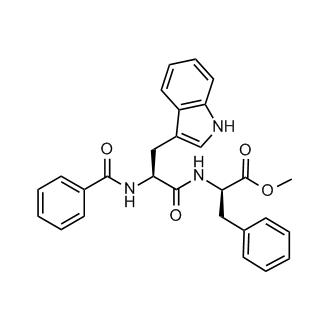| Size | Price | Stock |
|---|---|---|
| 5mg | $175 | In-stock |
| 10mg | $275 | In-stock |
| 50mg | $825 | In-stock |
| 100mg | $1400 | In-stock |
| 200 mg | Get quote | |
| 500 mg | Get quote | |
| We match the lowest price on market. | ||
We offer a substantial discount on larger orders, please inquire via [email protected]
or Fax: (86)21-58955996
Inquiry for price and availability only. Please place your order via our email or fax.
| Cat. No. : | HY-101283 |
| M.Wt: | 469.53 |
| Formula: | C28H27N3O4 |
| Purity: | >98 % |
| Solubility: | DMSO : 250 mg/mL (532.45 mM; Need ultrasonic) |
HCH6-1 is a potent and competitive dipeptide antagonist of Formyl peptide receptor 1 (FPR1). HCH6-1 inhibits chemotaxis, superoxide anion generation, and elastase release in human neutrophils specifically activated by fMLF (an FPR1 agonist). HCH6-1 has protective effects against acute lung injury (ALI) in vivo and can be used for the research of FPR1-involved inflammatory lung diseases[1]. IC50 & Target:IC50: Formyl peptide receptor 1 (FPR1)[1] In Vitro: In a cell-impermeable cytochrome c reduction assay, HCH6-1 significantly inhibits superoxide anion generation in fMLF (FPR1 agonist)-activated neutrophils with an IC50 of 0.32 μM. HCH6-1 has fewer inhibitory effects in WKYMVm (dual FPR1/FPR2 agonist)- and MMK1 (FPR2 agonist)-activated neutrophils, with IC50s of 4.98±0.27 μM and 17.68±2.77 μM, respectively[1].HCH6-1 does not induce LDH release even at 30 μM, so it does not have cytotoxic effects in human neutrophils. HCH6-1 does not alter the level of xanthine/xanthine oxidase superoxide anion and DPPH radical in cell-free systems[1].HCH6-1 significantly inhibits elastase release in fMLF-activated neutrophils, with an IC50 of 0.57 μM. However, in neutrophils triggered by WKYMVm or MMK1, HCH6-1 inhibits elastase release at higher concentrations, with IC50s of 5.22±0.69 μM and 10.00±0.65 μM, respectively[1]. In Vivo: HCH6-1 (intraperitoneal injection; 50 mg/kg; 1 h before LPS spray or 30 min after LPS spray) alone does not induce airspace inflammation. HCH6-1 pretreatment reduces inflammatory cell infiltration and distortion of pulmonary architecture in the presence of LPS. HCH6-1 posttreatment shows inhibitory effects on neutrophil accumulation and lung damage in LPS-induced ALI mice[1].
Lorem ipsum dolor sit amet, consectetur adipisicing elit. Autem earum hic iste maiores, nam neque rem suscipit. Adipisci consequatur error exercitationem fugit ipsam optio qui, quibusdam repellendus sed vero! Debitis.
Inquiry Information- Product Name:
- HCH6-1
- Cat. No.:
- HY-101283
- Quantity:


Your information is safe with us.